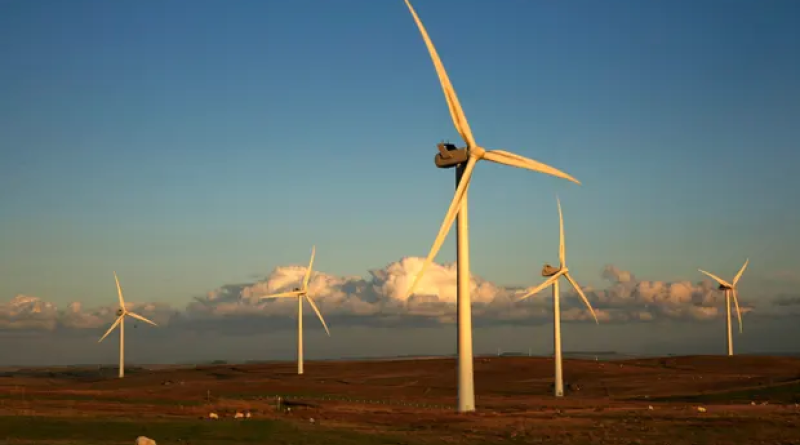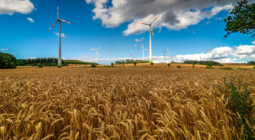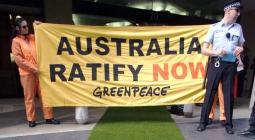Johnson to defy cabinet fears and push for onshore wind expansion

PM ‘passionate’ about potential in light of fresh push for self-sufficiency after Russia invasion of Ukraine.
Boris Johnson is expected to open the door to more onshore wind at next week’s energy strategy, despite some cabinet ministers lobbying against relaxing planning laws to allow more turbines.
The cabinet is split over whether to aim for more onshore wind projects, which can often get into lengthy planning battles, after officials drew up plans for a target of 30GW by 2030.
Ministers have not yet made a final decision but one senior government source said Johnson was “open minded” and “passionate” about offshore wind.
The business secretary, Kwasi Kwarteng, has made clear publicly that he would like to see planning rules relaxed in order to facilitate the building of more onshore windfarms. Michael Gove, who oversees the planning system, has also spoken in favour.
However, one cabinet minister said that there should not be a rush towards onshore wind because it was “extremely expensive” and “not cost-effective”.
Some are understood to prefer a push for fracking, despite safety and environmental concerns. Jacob Rees-Mogg, the Brexit opportunities minister, has publicly declared himself in favour exploiting more onshore gas in the UK.
The energy independence plan was announced by the prime minister after Russia’s invasion of Ukraine. Set to be published next week after some delays, it is expected to propose a rapid expansion of nuclear power and accelerated targets for renewables – but it is unclear whether a relaxation of planning rules around onshore wind will be included. Officials have suggested targets of 16GW of nuclear by 2030, 50GW of offshore by 2030, and 50GW of solar by 2030, the Guardian understands.
A Downing Street source said: “All options have to be on the table, given global price increases and the need to be self-sufficient – but nothing is decided yet.”
David Cameron’s government tightened planning rules for onshore wind developments in 2014, requiring more local consultation. Sparked by grassroots Tory opposition from communities, which saw the turbines as an eyesore, the move has effectively acted as a moratorium.
Eight members of Johnson’s cabinet – including Rees-Mogg, Steve Barclay, Brandon Lewis, Nadine Dorries, Nadhim Zahawi and Mark Spencer – were signatories to a 2012 letter opposing onshore wind, though a No 10 source said: “I wouldn’t read too much into that.”
At the time, the communities secretary, Eric Pickles, said: “We need to ensure that protecting the local environment is properly considered alongside the broader issues of protecting the global environment.”
Kwarteng has suggested the public’s opposition to windfarms has fallen away, given the push for net zero and the renewed interest in energy self-sufficiency since Russia’s invasion of Ukraine.
“There were quite understandable political reasons that people didn’t want to see large-scale, onshore winds in their vicinity. I think that’s changed,” he told the i newspaper earlier this week. “I think the prime minister has been very clear that onshore wind has got to be part of the mix and we’ve got to look at planning.”
He added: “The argument about onshore wind in 2015 was a historic argument even before we committed to net zero and the circumstances today with Putin. Russia, Saudi Arabia, all of those things mean that we’ve got to have more energy independence and I think onshore renewables are absolutely part of that.”
When asked if the prime minister agreed with Kwarteng’s view, Johnson’s official spokesperson said on Tuesday: “I think the public has recognised the need to diversify our energy supply and the importance of having sustainable energy sources, which move away from the volatility we see from non-renewables.”
Scotland has pushed ahead with onshore wind, with a more liberalised planning system, and is regarded in Whitehall as what one government source described as a “major success story”.
The UK has announced that it is seeking to phase out imports of Russian oil by the end of 2022 and will also examine ending Russian gas imports. Johnson was previously sceptical about windfarms, writing in 2013 that they couldn’t “pull the skin off a rice pudding”.
The shadow environment secretary, Ed Miliband, has argued that a “sprint” towards renewables, rather than investment in fracking, should be the government’s response to the crisis in Ukraine.
Author:Rowena Mason, Heather Stewart and Aubrey Allegretti
Photograph:Murdo MacLeod






